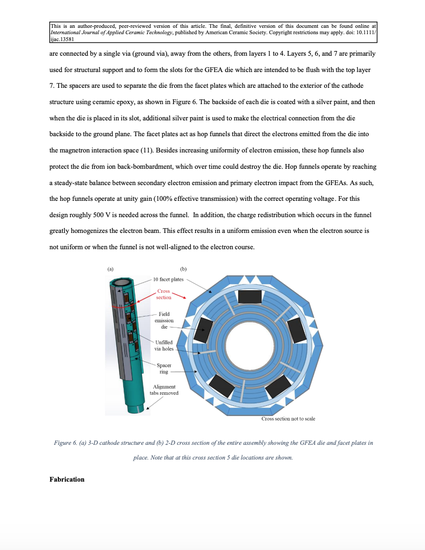
A Low Temperature Cofired Ceramic (LTCC) material system has been used to develop a protype field emission cathode structure for use in an experimental magnetron oscillator. The structure is designed for used with 30 Gated Field Emission Array (GFEA) die electrically connected through silver metal traces and electrical vias. To approximate a cylinder, the cathode structure (48 mm long and 13.7 mm in diameter) is comprised of 10 faceted plates which cover the GFEA dies. Slits in the facet plates allow electron injection. The GFEA die (3 mm x 8 mm) are placed in axial columns of 3 and spaced azimuthally around a cylindrical support structure in a staggered configuration resulting in 10 azimuthal locations. LTCC manufacturing techniques were developed in order to fabricate the newly designed cathode with 7 layers wrapped to form the cylinder with electrical traces and vias. Two different cathode wrapping techniques and two different via filling techniques were studied and compared. Two different facet plate manufacturing techniques were studied. Finally, four different support stand configurations for firing the cylindrical structure were also compared with a square post stand having the best circularity and linearity measurements of the fired structure.
This is the peer reviewed version of the following article:
Black, B.; Harper, R.; Ward, P.; Davlin, J.; Bentancourt, O.; Plumlee, D.; & Browning, J. (2020). A Cathode Support Structure for Use in a Magnetron Oscillator Experiment. International Journal of Applied Ceramic Technology, 17(5), 2393-2406.
which has been published by Wiley on behalf of The American Ceramic Society in final form at doi: 10.1111/ijac.13581. This article may be used for non-commercial purposes in accordance with Wiley Terms and Conditions for Self-Archiving.
Available at: http://works.bepress.com/jim_browning/49/
